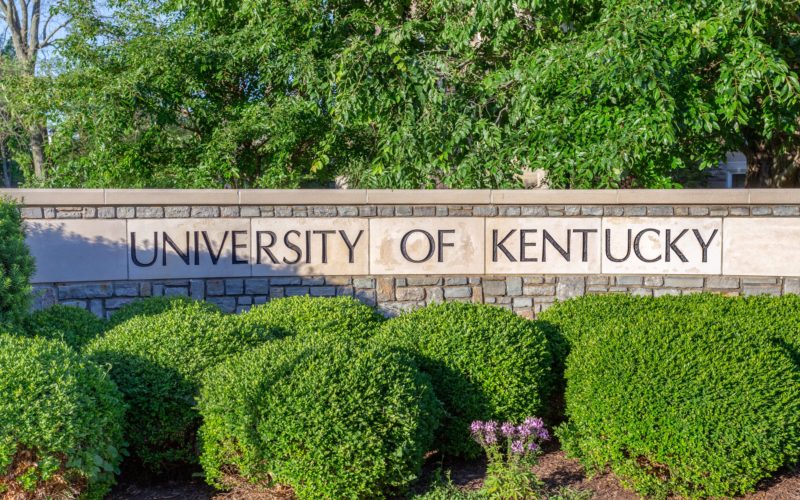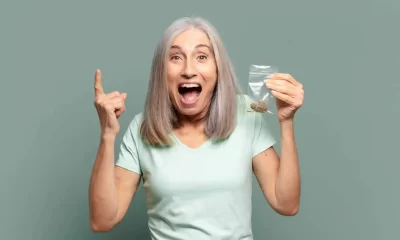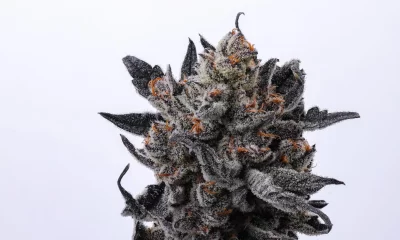Reports
University of Kentucky Opens New Cannabis Research Center

The center is the byproduct of a bill passed by Kentucky lawmakers this year and “will conduct research on the health effects of cannabis.”
The Bluegrass State’s flagship university is getting some green. In an announcement on Wednesday, the University of Kentucky heralded the opening of “a new center that will advance research on the medical use of cannabis.”
The “UK Cannabis Center,” as it is known, “will conduct research on the health effects of cannabis, including its risks and benefits when used to treat certain medical conditions.”
The center is the result of a bill passed by Kentucky lawmakers and signed into law by Gov. Andy Beshear earlier this year.
“The legislature is interested in having us explore the conditions for which medical cannabis might be useful, as well as the most effective dosing and route of administration for each condition,” said Dr. Shanna Babalonis, who will serve as director of the UK Cannabis Center.
The announcement on Wednesday said that Babalonis is “an assistant professor in the Department of Behavioral Science and a cannabis researcher at CDAR, is increasingly recognized as a leader in the cannabis field and an expert on the topic of medical cannabinoids,” boasting “three active National Institutes of Health grants, totaling nearly $3.5 million, aimed at examining cannabis-opioid interactions, cannabis effects in those with opioid use disorder and the effects of cannabis on simulated driving performance.”
“The new center will allow us to expand our clinical research, particularly focusing on medical conditions that may be helped by medical cannabis,” Babalonis said in the announcement.
The bill that established the UK Cannabis Center was passed in the closing days of the Kentucky legislative session in April. Beshear, a Democrat, used a line-item veto in his signing of the legislation, striking out certain parts of the bill that he said would “limit the purpose of the center and dictate who the president of the University of Kentucky should consider appointing to the advisory board after giving the president of the university sole appointing power.”
Beshear said earlier this year that he was entertaining the idea of using executive action to legalize medical cannabis in the state.
“We’re going to explore that,” Beshear said in April. “It’s something that we will look at. Its time has certainly come.”
That didn’t sit right with members of legislature, including Kentucky state Senate President Robert Stivers.
“The public should be concerned with a governor who thinks he can change statute by executive order,” Stivers said in a statement in April. “He simply can’t legalize medical marijuana by executive order; you can’t supersede a statute by executive order because it’s a Constitutional separation of powers violation.”
The bill that established the UK Cannabis Center was viewed as a compromise by Republicans in the state Senate who were not ready to fully legalize medical cannabis treatment. A bill legalizing medical cannabis passed out of the Kentucky state House of Representatives in March, but the measure was never brought to a vote in the state Senate.
In the announcement on Wednesday, the University of Kentucky said that the bill “also requires UK to apply to the U.S. Drug Enforcement Administration for a license to grow and cultivate cannabis,” and that if approved, “the center will be able to conduct agricultural research pertaining to optimal growing conditions.”
According to the announcement, “UK President Eli Capilouto recently appointed a multidisciplinary team of UK faculty members that will oversee the research center’s work and finances,” and the “12-member board includes an executive or steering committee that will work with Babalonis to establish the center’s research goals and agenda and make key financial decisions, and an advisory board to help guide and provide feedback on the center’s progress and overall direction.”
Source: https://hightimes.com/news/university-of-kentucky-opens-new-cannabis-research-center/
Business
Pot Odor Does Not Justify Probable Cause for Vehicle Searches, Minnesota Court Affirms

The Minnesota Supreme Court affirmed that cannabis odor does not constitute probable cause to search a vehicle.
If Minnesota police search a vehicle solely based upon the smell of pot, they can’t justify searching a vehicle, even if there is evidence found of other alleged crimes. Even after appealing a lower court decision to suppress the evidence—twice—the Minnesota Supreme Court agreed, and the dismissal of his charges stands.
In a ruling filed regarding a case the State of Minnesota Court of Appeals on Sept. 13, the Minnesota Supreme Court affirmed that cannabis odor does not constitute probable cause to search a vehicle.
The case has been ongoing for two years. On July 5, 2021, just before 10 p.m., a Litchfield police officer stopped a car for an obscure local law: the light bar mounted on the vehicle’s grill had more auxiliary driving lights than are permitted under Minnesota law. The officer asked the driver, Adam Lloyd Torgerson, for his license and registration. Torgerson, his wife, and his child were present in the vehicle. The officer stated that he smelled pot and asked Torgerson if there was any reason for the odor, which he initially denied. But cops found a lot more than just pot.
A backup officer was called in. The couple denied possessing any pot, but Torgerson admitted to smoking weed in the past. The second officer stated that the weed odor gave them probable cause to search the vehicle and ordered them to exit the vehicle. The first officer searched the vehicle and found a film canister, three pipes, and a small plastic bag in the center console. The plastic bag contained a white powder and the film canister contained meth, which was confirmed in a field test.
Torgenson was charged with possession of meth pipe in the presence of a minor and fifth-degree possession of a controlled substance after the unwarranted search of Torgerson’s vehicle.
Police Aren’t Allowed to Do That, Multiple Courts Rule
But the search had one major problem—cops weren’t searching for a meth pipe. They only searched his car because they could smell pot, and the meth and paraphernalia were a surprise for everyone. Still, they had no grounds to search the vehicle. The man’s charges were later dismissed after the district court determined the odor of cannabis alone was insufficient basis for probable cause to search the vehicle, regardless of whatever other drug paraphernalia they found.
The state appealed the case, but the Minnesota Court of Appeals affirmed the district court’s decision. The case was appealed a second time, this time to the Minnesota Supreme Court, which agreed with the lower court’s ruling.
“This search was justified only by the odor of marijuana emanating from the vehicle,” the Minnesota Supreme Court decision reads. “Torgerson moved to suppress the evidence found during the search, arguing that the odor of marijuana, alone, is insufficient to create the requisite probable cause to search a vehicle under the automobile exception to the warrant requirement. The district court granted Torgerson’s motion, suppressed the evidence, and dismissed the complaint. The State appealed. The court of appeals affirmed the district court’s suppression order. Because we conclude that the odor of marijuana emanating from a vehicle, alone, is insufficient to create the requisite probable cause to search a vehicle under the automobile exception to the warrant requirement, we affirm.”
It amounts to basic human rights that apply—regardless of whether or not a person is addicted to drugs.
Other States do Precisely the Same Regarding Pot Odor as Probably Cause
An Illinois judge ruled in 2021 that the odor of cannabis is not sufficient grounds for police to search a vehicle without a warrant during a traffic stop.
Daniel J. Dalton, Associate Judge of the 14th Judicial Circuit, issued a ruling in response to a motion to suppress evidence in the case of Vincent Molina, a medical cannabis patient arrested for cannabis possession last year.
In that case, Molina was arrested despite the decriminalization of small amounts of cannabis in Illinois in 2019 with the passage of the Illinois Cannabis Regulation and Tax Act.
In some states, the issue of probable cause and cannabis was defined through bills.
Last April, the Maryland House of Delegates approved a bill that reduces the penalties for public cannabis consumption and bars police from using the odor of cannabis as the basis for the search of an individual or auto. Under Maryland’s House Bill 1071, law enforcement officers would be prohibited from using the odor of raw or burnt cannabis as probable cause to search a person or vehicle.
The rulings represent the rights of citizens when they are pulled over by police, even if there are hard drugs involved.
Business
Legal Marijuana Handed A Nothing Burger From NY State

Following the chaos of the recreational weed rollout, the government is trying to figure out next steps. But it seems legal marijuana has been handed a nothing burger from NY state with their last rollout for potential cannabis retailers.. With an estimated $3.5 billion in sales at stake along with tax revenue for the state’s every growing budget, the fumble is costly for a significant number of players. And it has been a huge loss for the marijuana industry as a whole.
What was quickly seen as an opportunity was pounced on in the city with the most billionaires globally along with endless big and small entrepreneurs, and hustlers. Seeing a huge amount of cash on the table, players acted in a quickly in a way bureaucrats will never understand.
Embracing a Wild West approach, officials decriminalizated and fumbled licensed legalization of sales. Despite promises and initial outlines where existing medical marijuana dispensaries could switch to recreational and a fair, for government quick liscnese process, the state tossed it all in one stroke. In a vision of equity, officials decided to reserve the first retail licenses for felons and other “justice-involved” individuals. Lawsuits started, the desired licensees struggled to raise capital and over 1,600 unlicensed retail stores opened in NYC. For the small time players, they have set sidewalk card tables parks, selling roll-ups and handmade marijuana edibles, in full view of the police.
The updated systems was rolled out, but has left people confused, dispirited, and disappointed. The Office of Cannabis Management rolled out the previous Conditional Adult-Use Retail Dispensaries (CAURD) program with high hopes. Now, regulators voted to allow the state’s medical marijuana operators to apply for adult-use retail licenses. Multistate operators who have patiently acquired a majority of the state’s 10 registered organization.
“It was more like an orgy of minimalism. While they are getting ready to open the application window on October 4th (notably, originally it wasn’t intended to be a 60-day window, but rolling applications) for most license types (sans on-site consumption and delivery), they refused to address the CAURD program. Other than to suggest that it remains “a priority”, they have offered only some subtle hints in the guidance to the regulations. These include establishing a priority for retail applications which include secured real estate, which will be given priority after the initial 30-days of the 60-day application window have passed (although they do not define what that means). And noting that existing licensees may apply for an additional license so long as they comply with the rules of a two-tier system. The positive news is that these statements can be interpreted as an invitation to current CAURD licensees, many of whom will also meet other Social and Economic Equity (SEE) criteria entitling them to an additional priority.” shares Andrew Cooper, partner at Falcon Rappaport & Berkman LLP, one of the top cannabis law firms.
Unfortunately, there are multiple losers in the state’s unique approach. One is consumer and medical marijuana patients, including veterans. The unlicensed dispensaries are making a mint and overcharging customers due to high demand. Small investors and companies, including those who could be a player in the CAURD, will not have the financial to compete with multi-state and large players. And taxpayers will lose out for years to come as revue it lost to unlicensed dispensaries.
The good news, consumers will continue to find products easily over the next few years. There is even a thriving unlicensed dispensary a few blocks from City Hall.
While New York is awash with billionaires, fashion, food and smarts, common sense seems to be lack for making a good government plan.
Source: https://thefreshtoast.com/cannabis/legal-marijuana-handed-a-nothing-burger-from-ny-state/
Healthcare
This Activity Helps Those With Depression And Anxiety

A new study shows that exercise is extremely helpful for people coping with a mental health condition, affecting them more than people who don’t share these struggles.
One of the activities that people first recommend when discussing conditions like depression and anxiety is exercise. The suggestion is so pervasive that it’s almost a cliche by now. Still, evidence shows that exercise is incredibly helpful for your mental health, decreasing muscle tension, promoting the production of serotonin, and more.
A British study suggests that people with depression and anxiety are twice as likely to reap the benefits of exercise when compared to people who don’t suffer from these conditions.
The data was obtained by tracking the exercise patterns of over 50,000 people in their late fifties. About a third of them were affected by health conditions like depression and anxiety. While everyone experienced benefits from moderate amounts of exercise, people who had a mental health condition experienced 22 percent less risk of having a heart attack or a blocked coronary artery. For reference purposes, the majority of candidates only experienced a 17 percent decrease in their odds of suffering from a cardiac condition.
“The effect of physical activity on the brain’s stress response may be particularly relevant in those with stress-related psychiatric conditions. This is not to suggest that exercise is only effective in those with depression or anxiety, but we found that these patients seem to derive a greater cardiovascular benefit from physical activity,” said the lead researcher of the study, Hadil Zureigat.
Anxiety and other forms of stress can result in inflammation, a condition that creates risks for people’s circulatory systems. The effect of exercise targets different risk factors for people with an existing mental health condition, reducing the cortisol in their bodies and increasing cardiovascular health, all the while producing serotonin and boosting their moods.
Introducing a workout routine into your life when you don’t have one isn’t easy, but it’s often suggested to start off slow, taking your time to find an activity you find enjoyable. Just one exercise session can make you feel better, but the more you commit to it, the easier it gets to create a habit. Try working out with friends, outdoors, signing up to sports or classes — whatever keeps you accountable, and returning to your activity.
Source: https://thefreshtoast.com/news/this-activity-helps-those-with-depression-and-anxiety/
-

 Business2 years ago
Business2 years agoPot Odor Does Not Justify Probable Cause for Vehicle Searches, Minnesota Court Affirms
-

 Business2 years ago
Business2 years agoNew Mexico cannabis operator fined, loses license for alleged BioTrack fraud
-

 Business2 years ago
Business2 years agoAlabama to make another attempt Dec. 1 to award medical cannabis licenses
-

 Business2 years ago
Business2 years agoWashington State Pays Out $9.4 Million in Refunds Relating to Drug Convictions
-

 Business2 years ago
Business2 years agoMarijuana companies suing US attorney general in federal prohibition challenge
-

 Business2 years ago
Business2 years agoLegal Marijuana Handed A Nothing Burger From NY State
-

 Business2 years ago
Business2 years agoCan Cannabis Help Seasonal Depression
-

 Blogs2 years ago
Blogs2 years agoCannabis Art Is Flourishing On Etsy













